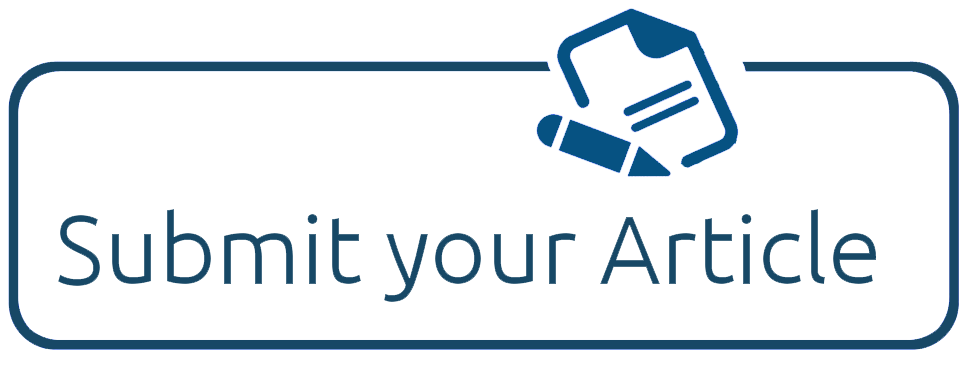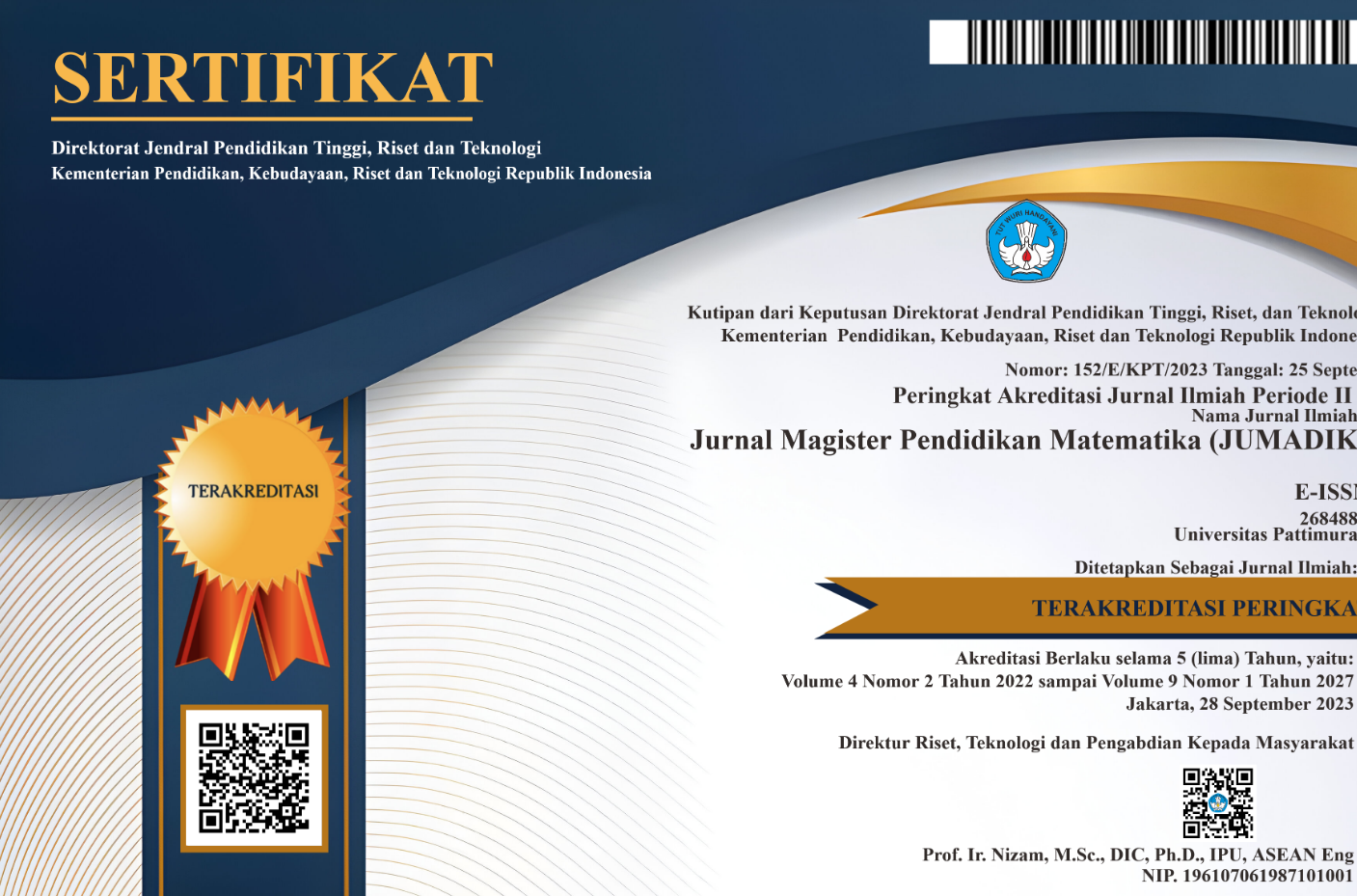ANALISIS KESALAHAN MAHASISWA DALAM PERKULIAHAN MATEMATIKA DASAR SECARA DARING
Abstract
Topik matematika dasar merupakan fokus utama saat mempersiapkan mahasiswa baru masuk sebelum masuk perkuliahan di jenjang perguruan tinggi. Oleh karena itu, mahasiswa harus dapat memahami konsep dari beberapa topik matematika dasar ini dengan baik. Tujuan penelitian ini adalah untuk mendeskrpsikan kesalahan-kesalahan dalam memahami topik-topik matematika dasar, yaitu topik himpunan, relasi, fungsi, matriks, vektor, limit, turunan dan integral. Penelitian ini menggunakan metode penelitian deskriptif kualitif dengan subjek penelitian adalah mahasiswa baru tahun akademik 2020/2021 pada Program Studi Pendidikan Matematika FKIP Unpatti. Instrumen dalam penelitian ini berupa soal tes yang terdiri dari 7 soal tentang topik-topik matematika dasar. Hasil penelitian menunjukkan bahwa mahasiswa melakukan beberapa kesalahan di antaranya kesalahan faktual, kesalahan prosedural, kesalahan konseptual dan kecerobohan
Downloads
References
Ahmad, A. M. (2016). Analisis Kesulitan Belajar Matematika Pada Materi Integral Luas Daerah di Bawah Kurva dan Volume Benda Putar. An-Nahdhah, 12(23), 159–176.
Ashlock, R. B. (2006). Error patterns in computation: using error patterns to improve instruction 9th Edition (9th ed.; L. A. Montgomery, ed.). Ohio, Columbus: Pearson Prentice Hall.
Brown, J., & Skow, K. (2016). Mathematics : with Instructor ’ s Guide Table of Contents n Mathematics : Identifying and Addressing Student Errors.
Hasim, E. (2020). PENERAPAN KURIKULUM MERDEKA BELAJAR PERGURUAN TINGGI DI MASA PANDEMI COVID-19. Prosiding Webinar Magister Pendidikan Dasar Pascasarjana Universitas Negeri Gorontalo “ Pengembangan Profesionalisme Guru Melalui Penulisan Karya Ilmiah Menuju Anak Merdeka Belajar, 68–74. Gorontalo: Universitas Negeri Gorontalo.
Kapur, M. (2014). Productive failure in learning math. Cognitive Science, 38(5), 1008–1022. https://doi.org/10.1111/cogs.12107
Kesumawati, N. (2008). Pemahaman konsep matematik dalam pembelajaran matematika. Prosiding SeminarNasional Matematika Dan Pendidikan Matematika, Jurusan Pendidikan Matematika Fakultas Matematika Dan Ilmu Pengetahuan Alam Universitas Negeri Yogyakarta, 229–235.
Mataheru, W. 2017. Laporan Kegiatan Matrikulasi. Ambon. Program Studi Pendidikan Matematika FKIP Unpatti.
Mills, G. E., & Gay, L. R. (2019). Educational Research: Competencies for analysis and application Twelfth Edition. In Pearson Education (Twelfth). United State America: Pearson Education.
Morgan, C. (2005). Word, definitions and concepts in discourses of mathematics, teaching and learning. Language and Education, 19(2), 102–116. https://doi.org/10.1080/09500780508668666
Nurhikmayati, I. (2017). Analisis kesulitan belajar mahasiswa pada matakuliah matematika dasar. Theorems, 2(1), 74–85.
Pesek, D. D., & Kirshner, D. (2000). Interference of instrumental instruction in subsequent relational learning. Journal for Research in Mathematics Education, 31(5), 524–540. https://doi.org/10.2307/749885
Pradini, W. (2019). Analisis kesalahan siswa dalam menyelesaikan soal cerita persamaan linear dua variabel. Pythagoras: Jurnal Pendidikan Matematika, 14(1), 33–45. https://doi.org/10.21831/pg.v14i1.21481
Ratumanan, T. G., & Laurens, T. (2016). ANALISIS PENGUASAAN OBJEK MATEMATIKA (Kajian pada Lulusan SMA Di Provinsi Maluku). Jurnal Pendidikan Matematika Raflesia, 1(2), 146–154.
Rosmaiyadi. (2018). Analisis Kesalahan Penyelesaian Soal Aljabar Pada Mahasiswa Program Studi Pendidikan Matematika STKIP Singkawang. Jurnal Pendidikan Matematika, 12(1), 59–70.
Schnepper, L. C., & McCoy, L. P. (2013). Analysis of Misconceptions in High School Mathematics. Networks: An Online Journal for Teacher Research, 15(1), 625–625. https://doi.org/10.4148/2470-6353.1066
Subanji, & Nusantara, T. (2013). Karakterisasi kesalahan berpikir siswa dalam mengonstruksi konsep matematika. Jurnal Ilmu Pendidikan, 19(2), 208–217.
Utari, R. S., & Utami, A. (2019). Kemampuan Pemahaman Konsep Mahasiswa Dalam Mengidentifikasi Penyelesaian Soal Integral Tak Tentu Dan Tentu. Jurnal Pendidikan Matematika, 14(1), 39–50. https://doi.org/10.22342/jpm.14.1.6820.39-50
Veloo, A., Krishnasamy, H. N., & Wan Abdullah, W. S. (2015). Types of student errors in mathematical symbols, graphs and problem-solving. Asian Social Science, 11(15), 324–334. https://doi.org/10.5539/ass.v11n15p324
Vinner, S. (2002). The role of aesthetics in the teaching and learning of data modelling. In Advanced mathematical thinking (pp. 65–81). https://doi.org/10.1080/09500693.2021.1875514
Zulkardi. 2003. Pendidikan Matematika di Indonesia: Beberapa Permasalahan dan Upaya Penyelesaiannya. Palembang: Universitas Sriwijaya
Copyright (c) 2021 Wilmintjie Mataheru, Novalin C Huwaa, Christi Matitaputty

This work is licensed under a Creative Commons Attribution-NonCommercial-ShareAlike 4.0 International License.
License and Copyright Agreement
In submitting the manuscript to the journal, the authors certify that:
- They are authorized by their co-authors to enter into these arrangements.
- The work described has not been formally published before, except in the form of an abstract or as part of a published lecture, review, thesis, or overlay journal. Please also carefully read Jurnal Magister Pendidikan Matematika (JUMADIKA) Posting Your Article Policy.
- That it is not under consideration for publication elsewhere,
- That its publication has been approved by all the author(s) and by the responsible authorities – tacitly or explicitly – of the institutes where the work has been carried out.
- They secure the right to reproduce any material that has already been published or copyrighted elsewhere.
- They agree to the following license and copyright agreement.
Copyright
Authors who publish with Jurnal Magister Pendidikan Matematika (JUMADIKA) agree to the following terms:
- Authors retain copyright and grant the journal right of first publication with the work simultaneously licensed under a Creative Commons Attribution-NonCommercial-ShareAlike 4.0 International License (http://creativecommons.org/licenses/by-nc-sa/4.0/) that allows others to share the work with an acknowledgment of the work's authorship and initial publication in this journal.
- Authors are able to enter into separate, additional contractual arrangements for the non-exclusive distribution of the journal's published version of the work (e.g., post it to an institutional repository or publish it in a book), with an acknowledgment of its initial publication in this journal.
- Authors are permitted and encouraged to post their work online (e.g., in institutional repositories or on their website) prior to and during the submission process, as it can lead to productive exchanges, as well as earlier and greater citation of published work.








